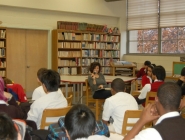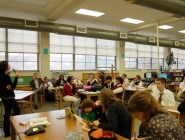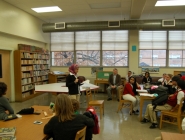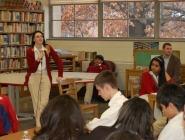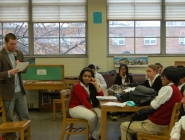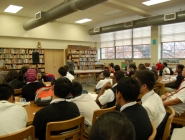December 10, 2012-The 60 students in Al-Bustan’s Arab culture class at Northeast High School were treated to a rare opportunity when they gathered in the NEHS library to hear Nada Bakri, widow of the New York Times reporter Anthony Shadid, answer questions about her life and the life of her husband, who passed away in Syria on February 16, 2012. The students began gathering in the library at the beginning of third period. Ms. Bakri arrived with her two and half year-old son, who played with a wooden train set while his mother spoke to the students about journalism, the Middle East, and the life of Anthony Shadid. Students learned a great deal from this event and they had the chance to thank Ms. Bakri with their own words and writings.
Published shortly after his death, Mr. Shadid’s memoir House of Stone details a year he spent in his family’s ancestral home in Lebanon, rebuilding a family house that had been damaged by rocket fire in the recent conflict with Israel. In addition to stirring descriptions of life in a Lebanese village, the book is a meditation on the concept of “home” (bayt in Arabic), those sources of identity that endure through time, immigration, and conflict. The students from NEHS come from a dizzying array of backgrounds. Among the cultural identities are Palestinians, Iraqis, Jamaicans, Cambodians, Chinese, Albanians, Ukrainians, Ethiopians, and more. Understandably, they responded with great interest to the themes examined in House of Stone. When they learned of Mr. Shadid’s intentional effort to learn the Arabic language – which he did not speak as a child despite his family’s Arab heritage – many students responded to that drive to re-connect with their own culture. “What I found interesting about the life of Anthony Shadid was that before he was a journalist, he did not know the language . . . of the Arab world,” wrote one student who identifies with her Brazilian heritage. Other students told stories of parents talking about their country of origin, or holding onto those memories themselves for those who made the journey to Philadelphia when they were old enough to remember.
In previous classes, the students had learned about Anthony Shadid’s extraordinary career covering events in the Middle East for a number of prestigious publications. They learned about his courageous reporting in Israel/Palestine in 2002, Iraq during the American invasion and occupation, and Libya in 2011. Students were very interested to hear about his experiences as a journalist. When asked about her husband, Ms. Bakri frequently returned to his love of humanity and how that influenced his award-winning reporting. “He loved to spend most of his time on the ground talking to the people.” Ensuring that the stories of people living in conflict were told was one of the things that drove him in his career.
Faced with a question of how to pursue a career in journalism, Ms. Bakri related an interaction she had with her late husband. “The most important thing is to do whatever you love with excellence.” “He was a perfectionist. . . . He would always say, ‘[write] to the best of your ability, because the story will be around, people will read it, and it will be remembered.’” In a written reflection, one student described how these words touched her, “During the Nada Bakri speech, I felt that she taught me a lot about self-perseverance. She made clear how important it is to put your entire mind to something, and really doing your best at whatever it is you have love to do. Her husband did this throughout his life, and he turned out to be a great man.”
Another recurring theme was Anthony Shadid’s love of and interest for the Arab world. Although he was a native of Oklahoma, his family had emigrated from Lebanon. Inspired by a trip to Jerusalem during his college years, Mr. Shadid worked to learn the Arabic language and delved deeply into the culture of the Arab world. “He made himself an expert in the Middle East,” Nada Bakri said. “He didn’t feel as comfortable writing in other places” where his knowledge was not so deep. One student appreciated these lessons, writing that Mr. Shadid “believed that the career path one decides to takes should be so important to that person that they work hard to be the best at what they do.” She concluded by applying that to her own life, “I am good at many things but not the best at anything and this motivated me to work harder.
In the week prior, the students had read two passages from House of Stone that relate particularly to the experience of immigrants. One detailed the Arab concept of bayt, or the home that is the “identity that does not fade.” The students, many of whom are recent immigrants, were led to reflect on their own conceptions of home, which may or may not be the house where they currently reside. Similarly, they composed their own writings on another passage from Mr. Shadid’s memoir which reflected on the abruptness of the immigrant experience. When you leave your home in search of another, Mr. Shadid writes,“it is not just the others who have been left behind; it is all of you that is known. Gone is the power of punishment of your family name, the hard-earned reputations of fore-bears, no longer familiar to anyone, not in this new place.”
As a way of saying thank you to Ms. Bakri for her time, a few students volunteered to read their reflections. One Iraqi students named Ghaid approached the front of the room and read, “Before the night we left Iraq and went to Syria, we never thought that we would ever live in a place other than Baghdad. We had to leave the country as soon as possible, because death and jail were not far away.” She described her family’s escape from post-invasion Iraq, through Syria, to the United States. “Now,” she wrote, “we are just fine. But it is never like our country,” concluding with a strong desire to return to her native land someday.
Anthony Shadid’s writings contained innumerable themes and issues. One of them, certainly, was encapsulated in this Iraqi student’s words; the inevitable tension between exploring the world, keeping connections with home. Anthony Shadid’s writings helped illuminate the world, its cultures, and people. His voice will be sorely missed.
Nada Bakri’s visit was made possible through sponsorship by Qatar Foundation International.


